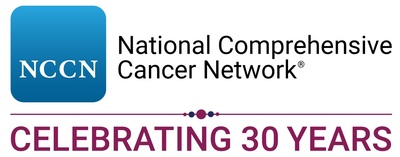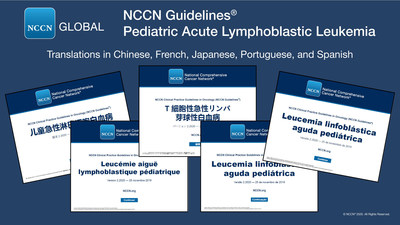 |
NCCN Guidelines for Pediatric Acute Lymphoblastic Leukemia in Chinese, Japanese, French, Spanish, and Portuguese are now available for free at NCCN.org
PLYMOUTH MEETING, Pa., June 17, 2020 /PRNewswire/ -- The National Comprehensive Cancer Network® (NCCN®)—an alliance of leading cancer centers in the United States—is announcing the publication of translated versions of the NCCN Guidelines® for Pediatric Acute Lymphoblastic Leukemia (ALL) into Chinese, French, Japanese, Portuguese, and Spanish. Pediatric ALL is the most common type of cancer in children, but is highly curable when treated with contemporary and evidence-based approaches.1 NCCN Guidelines are written and updated by leading authorities across various health disciplines. They include the most comprehensive and up-to-date recommendations for treating patients, including children, with cancer outside of a clinical trial setting.

"More young lives could be saved through the application of widely-available, evidence-based treatments," said Robert W. Carlson, MD, Chief Executive Officer, NCCN. "Advances in the fight against pediatric ALL have been remarkable in recent years. We can improve the cure rate even further by making sure best practices are reaching every corner of the earth. We get closer to achieving this goal by making evidence-based, expert consensus-driven NCCN Guidelines more accessible to non-English speakers."
The English-language version of NCCN Guidelines for Pediatric ALL was first published in May of 2019. The recommendations cover typical treatment algorithms, such as multi-agent chemotherapy regimens, as well as emerging innovations in targeted therapy and chimeric antigen receptor (CAR) T-cell therapy, a type of immunotherapy. The guidelines are intended for the management of patients from birth through adolescence and into young adulthood.
"These NCCN Guidelines include a strong focus on supportive care in order to reduce potentially dangerous side-effects for children undergoing treatment," explained Dr. Carlson. "They also help identify vulnerable populations, such as infants or patients with Down syndrome, and provide specific recommendations for keeping them as safe as possible, both short- and long-term."
The translated guidelines are available free-of-charge for non-commercial use at NCCN.org/global or via the Virtual Library of NCCN Guidelines® App.
The NCCN Global Department constantly updates and expands adaptations and translations of NCCN Guidelines for all major cancer types plus supportive care and prevention. More than 40 new translations have published this year alone, including clinical guidelines and patient-friendly versions. NCCN also provides NCCN Framework for Resource Stratification of NCCN Guidelines (NCCN Framework™) and NCCN Harmonized Guidelines™ with optimal recommendations alongside pragmatic approaches for adapting treatment in resource-constrained settings, such as low- and middle-income countries. Visit AlliedAgainstCancer.org to learn about NCCN's ongoing work in Sub-Saharan Africa with the African Cancer Coalition, American Cancer Society, Clinton Health Access Initiative, and IBM.
Free recommendations for self-care and stress management for cancer patients, caregivers, and providers during the COVID-19 pandemic are now available in English, Chinese, and Spanish at NCCN.org/covid-19.
Visit NCCN.org/global for more on everything the organization is doing to improve cancer care worldwide, and join the conversation online with the hashtag #NCCNGlobal.
About the National Comprehensive Cancer Network
The National Comprehensive Cancer Network® (NCCN®) is a not-for-profit alliance of leading cancer centers devoted to patient care, research, and education. NCCN is dedicated to improving and facilitating quality, effective, efficient, and accessible cancer care so patients can live better lives. The NCCN Clinical Practice Guidelines in Oncology (NCCN Guidelines®) provide transparent, evidence-based, expert consensus recommendations for cancer treatment, prevention, and supportive services; they are the recognized standard for clinical direction and policy in cancer management and the most thorough and frequently-updated clinical practice guidelines available in any area of medicine. The NCCN Guidelines for Patients® provide expert cancer treatment information to inform and empower patients and caregivers, through support from the NCCN Foundation®. NCCN also advances continuing education, global initiatives, policy, and research collaboration and publication in oncology. Visit NCCN.org for more information and follow NCCN on Facebook @NCCNorg, Instagram @NCCNorg, and Twitter @NCCN.
1 Esparza SD, Sakamoto KM, Topics in pediatric leukemia-acute lymphoblastic leukemia. MedGenMed 2005;7:23. Available at: https://www.ncbi.nlm.nih.gov/pubmed/16369328. Ma H, Sun H Sun X. Survival improvement by decade of patients aged 0-14 years with acute lymphoblastic leukemia: a SEER analysis. Sci Rep 2014;4:4227. Available at: https://www.ncbi.nlm.nih.gov/pubmed/24572378.
Media Contact:
Rachel Darwin
267-622-6624
darwin@nccn.org
Photo - https://mma.prnewswire.com/media/1180364/NCCN_Pediatric_Acute_Lymphoblastic_Leukemia_translations.jpg
Logo - https://mma.prnewswire.com/media/441768/NCCN_Logo.jpg